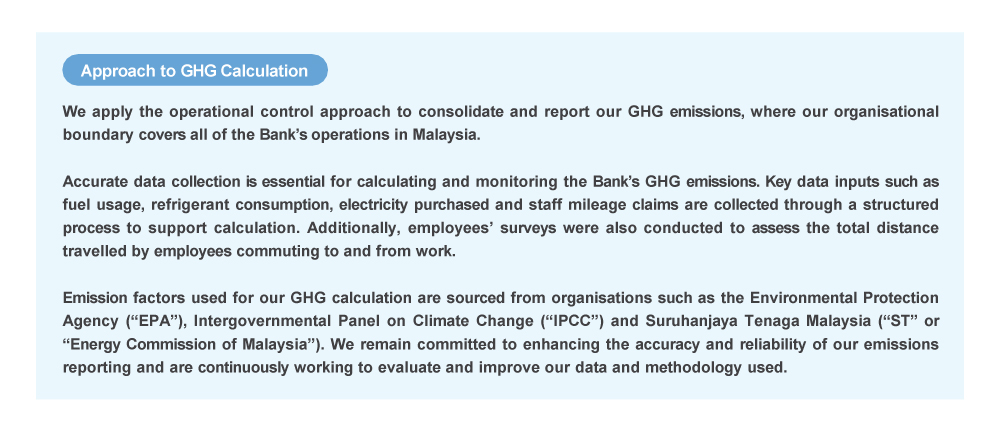Our Environment
Our Commitment to Address Climate Change
We recognise the role of the financial sector in supporting Malaysia’s achievement of its Nationally Determined Contribution (NDC) aligned to the 2015 Paris Agreement goals to limit the global temperature increase to well below 2 degrees Celcius above pre-industrial levels. Additionally, we are committed to contribute towards Bank Negara Malaysia’s (BNM) Financial Sector Blueprint 2022-2026 to facilitate a just and orderly transition to a greener and low carbon economy. As a responsible member of the industry, we remain fully committed to doing our part to promote sustainability and reduce our environmental footprint. To ensure that our operations are aligned with global sustainability goals, we are continuously enhancing our policies and procedures to be more ESG-focused. We have also begun assessing our climate-related risks and opportunities, and will continue to progressively build capacity to align with international best practices moving forward. This will enable us to better measure and manage the environmental impact of our business activities.
As part of enhancing transparency and engagement with our stakeholders on our response to climate change, we have progressively adopted the recommendations of the Task Force on Climate-related Financial Disclosures (“TCFD”) since 2022.
An overview of our climate action is as follows:
Governance
-
Within ABMB, sustainability and climate-related matters are governed through our sustainability governance structure, which stipulates accountabilities at the Board, management and working-levels within the Bank. The Board sets the tone from the top and oversees sustainability and climate-related strategies, policies and processes. The Group Sustainability Committee (GSC) and Group Risk Management Committee (GRMC) are responsible Board-level committees to provide oversight on climate-related risk management. The full details regarding our sustainability and climate-related governance arrangements are detailed in the Sustainability Governance tab or our Annual Report.
-
To ensure the Bank’s sustainability goals are achieved, we have incorporated the sustainability topline goals into specific targets and KPIs into the scorecard of the GCEO and Senior Management, which are cascaded down to relevant levels of management. The executive remuneration structure takes into consideration the Bank’s performance of its sustainability and climate-related goals through short-term incentive bonus funding at the group, division and individual levels. The long-term incentive plan incorporating the Bank’s key sustainability and climate-related goals is under review.
-
To reiterate our commitment to mitigate climate change, we participate in the following committees as active members and contributors to take action in accelerating the nation’s sustainability agenda:
-
Joint Committee on Climate Change (JC3) Sub-Committee 1 – Risk Management, which was established to pursue collaborative action for building climate resilience within the Malaysian financial sector. The Sub-Committee focuses on risk management by facilitating development of climate-related prudential standards and risk management policy, as well as to formulate responses to climate-related issues and risks. The Bank is represented by Alliance Bank’s Chief Sustainability Officer and Head Group Climate and Sustainability Risk.
-
The Bank is also part of the Climate Change and Principle-based Taxonomy Implementation Group (“CCPT IG”) which serves as an industry collaborative platform to share progress of CCPT implementation and facilitate technical experiences and discussions related to the application of CCPT Guidance document. The CCPT IG facilitates the identification and remediation of implementation issues with the aim to promote consistent application of CCPT across the industry. The Bank is represented by Alliance Bank’s Chief Sustainability Officer and Head Group Climate and Sustainability Risk.
-
The Bank is also currently involved in the JC3 SME Focus Group and is being represented by the Group Chief Strategy & Transformation Officer and Chief Sustainability Officer. The Bank is actively involved by serving as the Focus Group’s Awareness Subgroup Lead, represented by Alliance Bank's Chief Sustainability Officer, which entails leading the subgroup to develop and execute relevant strategies, action plans and deliverables to promote climate awareness amongst SMEs.
-
We have also become a member of United Nations Global Compact in September 2022. As a member of UNGC, the Bank is committed to uphold, promote and implement the Ten Principles of the United Nations Global Compact relating to human rights, labour, environment and anti-corruption:
Principle 1 We support and respect the protection of internationally proclaimed human rights. Principle 2 We ensure that we are not complicit in human rights abuses. Principle 3 We uphold the freedom of association and the effective recognition of the right to collective bargaining. Principle 4 We support the elimination of all forms of forced and compulsory labour. Principle 5 We support the effective abolition of child labour. Principle 6 We support the elimination of discrimination in respect of employment and occupation. Principle 7 We support a precautionary approach to environmental challenges. Principle 8 We aim to undertake initiatives to promote greater environmental responsibility. Principle 9 We encourage the development and diffusion of environmentally friendly technologies. Principle 10 We work against corruption in all its forms, including extortion and bribery.
Principle 1 We support and respect the protection of internationally proclaimed human rights. Principle 2 We ensure that we are not complicit in human rights abuses. Principle 3 We uphold the freedom of association and the effective recognition of the right to collective bargaining. Principle 4 We support the elimination of all forms of forced and compulsory labour. Principle 5 We support the effective abolition of child labour. Principle 6 We support the elimination of discrimination in respect of employment and occupation. Principle 7 We support a precautionary approach to environmental challenges. Principle 8 We aim to undertake initiatives to promote greater environmental responsibility. Principle 9 We encourage the development and diffusion of environmentally friendly technologies. Principle 10 We work against corruption in all its forms, including extortion and bribery.
-
As a member of the Association of Banks Malaysia (ABM) and ABM ESG Committee, we are also committed to adopt their seven ESG Principles which aims to support Malaysia’s NDC in accordance with the United Nations Framework Convention on Climate Change (UNFCCC). These seven ESG Principles are also aligned with our Sustainability Strategy Framework:
Principle 1 We commit to achieve Carbon Net Zero across our entire business and financed customer portfolio. Principle 2 We commit to incorporate ESG into our governance and risk management approach. Principle 3 We commit to identify, mitigate & manage risks of modern slavery and human rights risk across our supply chain. Principle 4 We commit to support financing for Agribusiness customers. Principle 5 We commit to encourage sustainable practices within the high impact industry sectors for ESG. Principle 6 We commit to social & financial inclusion to ensure a sustainable future. Principle 7 We commit to report publicly on our ESG practices and progress in achieving these commitments. Principle 1 We commit to achieve Carbon Net Zero across our entire business and financed customer portfolio. Principle 2 We commit to incorporate ESG into our governance and risk management approach. Principle 3 We commit to identify, mitigate & manage risks of modern slavery and human rights risk across our supply chain. Principle 4 We commit to support financing for Agribusiness customers. Principle 5 We commit to encourage sustainable practices within the high impact industry sectors for ESG. Principle 6 We commit to social & financial inclusion to ensure a sustainable future. Principle 7 We commit to report publicly on our ESG practices and progress in achieving these commitments.
-
Strategy
-
As part of our efforts to comply with Bank Negara Malaysia’s (BNM) Policy Document Climate Risk Management and Scenario Analysis (CRMSA), we are working to set a clear strategy in relation to our climate-related risks and opportunities.
-
Climate-related risks and opportunities are presently incorporated into our sustainability strategy framework through our topline goals including Topline Goal 1, which seeks to increase our sustainable banking business covering financing of climate mitigation and climate adaptation activities. The Bank has also recently developed and adopted its Sustainable Product Framework (SPF), which seeks to define the scope of sustainable banking business at the Bank. The SPF will assist in the development of sustainable financing products, programs, and offerings in support of climate-supporting activities and activities meeting defined environmental, social, and transition criteria.
-
The full details regarding our climate-related initiatives are detailed in our Annual Report.
Risk Management
-
Recognising climate change as a significant risk to the Bank, we are working to enhance our risk management practices in relation to our climate-related risks and opportunities in line with Bank Negara Malaysia’s (BNM) Policy Document Climate Risk Management and Scenario Analysis (CRMSA). This includes identifying our climate-related risks and opportunities.
-
The latest developments in climate risk management within the Bank include the following:
-
Effective 1 April 2023, a dedicated Group Climate & Sustainability Risk Department has been established within the Group Risk Management function to build infrastructure and capacity to manage climate-related and sustainability risks in the operations and risk-taking activities. We have also developed and enforced the Climate Risk Management Framework, which incorporates climate and sustainability risk considerations into our internal governance, processes, policies and business strategies.
-
We have incorporated climate-related risk in the risk management frameworks and processes of credit risk, market risk and operational risk to ensure our exposures to climate-related risks and their transmission to other risk types are appropriately identified and dealt with.
-
Climate-related risks have been included in the Bank’s Internal Capital Adequacy Assessment Process (ICAAP) wherein climate-related risk exposures and impact to the portfolio of the Group and entities is assessed at least annually to determine whether additional capital should be set aside.
-
We have also set climate and ESG related Risk Appetite Statements (RAS) Key Risk Indicators (KRIs) and Metrics to monitor the risk levels as monitoring measures, management actions will be taken if the risk thresholds are triggered.
-
Our sustainable lending and investment practices are guided by in-house risk assessment tools, namely our CCPT Screener, which is based on the BNM CCPT requirements, ESG Risk Acceptance Criteria or RAC, and Prohibited Lending List.
-
Climate-related risk management requirements have been incorporated into the Bank’s Policy on Outsourcing. On-boarding and periodic review of outsourced service providers are subject to review of climate-related risks and mitigations, to ensure that services can be continued without major disruption under climate-related events. This includes information technology services.
-
We have developed a transition plan to address climate change and environmental concerns, as well as the incorporation of the plan into our Sustainability Strategy.
-
-
We have also incorporated climate and sustainability risk considerations into our overall Risk Management Framework, Sustainability Framework, ESG Screener Checklist and Risk Acceptance Criteria User Guide, Credit Risk Management Framework, Operational Risk Management Framework and Market Risk Management Framework.
-
Measures to mitigate and adapt to physical risks have also been undertaken. In terms of credit risk, credit risk management will involve aggregation of risks and commensurate limit assignment, pricing and collateralisation for physical risks. In terms of operational risk, our operating premises in flood prone locations are fixed with flood barriers while our business continuity plans include flood considerations. Our vendors are required to provide physical risk assessment and mitigation plans where necessary. These plans are reviewed periodically to ensure mitigating actions are up to date.
-
We track our involvement in ESG-sensitive sectors and our participation in these sectors is informed by the evolution of our exposure. As of March 31, 2025, ABMB’s exposure to ESG-sensitive sectors is at a low 4.5% (RM1.96billion) of the Bank’s total non-retail exposure. The breakdown is as follows:
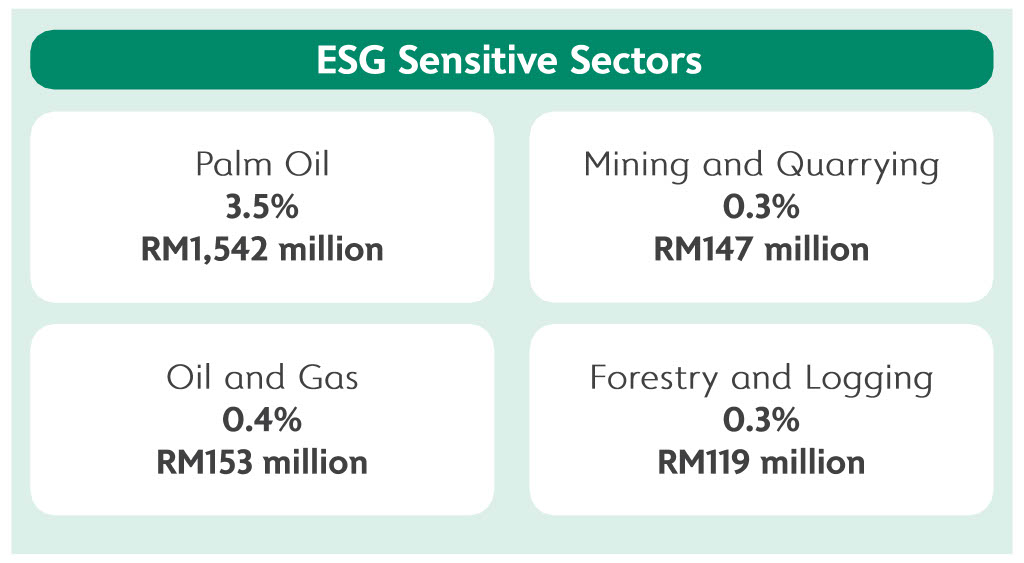 |
-
The full details regarding our climate-related risk management practices are detailed in our Annual Report.
ESG Lending Policies
The Bank integrates comprehensive and stringent ESG risk management processes and is currently taking proactive actions to prohibit lending/financing for these activities or businesses:
- Coal mining
- New financing of coal-fired power plants
- Unconventional oil & gas extraction (e.g. using hydraulic fracturing)
- Financing of hostile takeover of a company
- Bars and pubs, night clubs, video arcades, karaokes, cyber cafes, reflexology centres, massage parlours
- Projects or activities that cause environmental hazards
- Illegal activities
- Lending that is prohibited by law and/or regulatory guidelines
- Arms trading (excluding government defence contracts)
The Bank also recognises the importance of managing Environmental, Social and Governance (“ESG”) risks and have incorporated measures to mitigate such risks in our lending processes for new and existing customers.
We have established a General and Industry-Specific Risk Acceptance Criteria (RAC) framework and implemented an ESG screener tool to identify customers that require assistance in adopting sustainable practices.
The RAC framework covers the criteria for general and ESG-sensitive sectors. All lending/financing activities are subject to the General RAC that covers areas such as:
- Addressing material environmental issues via business processes and operations
- Share of renewable energy in the energy consumption mix
- Establishment of safe and fair working conditions
- Establishment of fair and effective labour management
- Exploitation of the local community
- Establishment of anti-bribery and corruption policies
- Legal issues or non-compliance with regulatory requirements, including pollution prevention legal requirements, especially with respect to solid waste and hazardous materials management and disposal
- Establishment of clear distribution of roles & responsibilities
- Women representation on the board for public-listed companies
On top of the General RAC, the following four sectors identified as ESG-sensitive are subject to additional Industry-Specific RACs that factor in local and international standards:
- Palm Oil
- Oil & gas
- Mining & quarrying
- Forestry & logging
Customers with palm oil estates and smallholding millers and refineries are required to meet the following standards:
- Obtained Roundtable on Sustainable Palm Oil (RSPO) or Malaysian Sustainable Palm Oil (MSPO) or are in the process of obtaining one of the two certifications. Customers that have obtained the said certifications are expected to have complied with MPOB’s Code of Good Milling Practice
- Have no prior cases pertaining to environmentally-damaging burning practices
- New plantations must not convert or degrade High Biodiversity Value/High Conservation Value and High Carbon Stock
- New plantations must not convert or degrade High Biodiversity Value or High Conservation Value and High Carbon Stock forests, primary forests, forest reserves and peatland
- Establishment of a water and pollution management plan
- Customers with millers and refineries are to comply with additional standards such as methane gas trapping facilities or emission avoidance
Oil & Gas
Customers are required to meet the following standards:
- Obtained Environmental Management Systems (EMS) certification
- Additional mitigation plan in place, i.e. Carbon Monoxide (CO), Nitrogen oxides (NOX), sulphur oxides (SOX), and other significant air emissions and related impacts
- Establishment of biodiversity conversation and climate-mitigation policies
- Establishment of a water and pollution management plan, including on-site assessment on waste storage, handling and disposal
- Oil Spill Contingency Plan (“OSCP”) in place for efficient treatment of water discharges, spills, and leaks, i.e. total volume of hydrocarbon discharged within produced water
- Establishment of Standard Operating Procedures (SOPs) which govern daily activities and/or work processes at oil and gas sites
- Development of an Emergency Response Plan (ERP) that is maintained and tested
Mining & Quarrying
Customers are required to meet the following standards:
- Obtained Environmental Impact Assessment Report for every lessee of a mining lease covering a total area of over 250 hectares
- Establishment of internal pollution prevention procedures
- Obtained approval from relevant governmental agencies, i.e. “Surat Kebenaran Skim Pengendalian Melombong” (SKSPM) issued by Department of Mineral and Geoscience Malaysia, Ministry of Energy and Natural Resources or equivalent approval in other jurisdictions
- Establishment of SOPs to govern activities at the mining site
- Establishment of an Emergency Response Plan
Forestry & Logging
Customers are required to meet the following standards:
- Obtained Environmental Impact Assessment Report, for logging activities with a concession area of more than 500 hectares
- Establishment of a biodiversity-conservation and climate-mitigation or greenhouse gases (GHG) management plan
- Establishment of water and pollution management plan for managing waste arising from timber or pulp production, including on-site assessment on waste storage, handling and disposal
- Protection of natural waterways through buffer or riparian zones
- Protection of community safety and customary lands of indigenous people
- Obtained approval from relevant governmental agencies
From the RAC assessment that is utilised during the on-boarding and through the annual review process, a time-bound action plan may be imposed to manage clients that are unable to fulfil the mandatory ESG criteria.
Metrics and Targets
Operational Emissions
We have established our operational greenhouse gas emissions (GHG) emissions baseline for FY2020, and tracked our emissions against this record for our Scope 1 GHG emissions, Scope 2 GHG emissions and Scope 3 business travel by land emissions.
This year, we have expanded our Scope 1 GHG emissions to include fugitive emissions and Scope 3 GHG emissions to include emissions from business air travel and employee commuting.
The following details our operational Scope 1, 2 and 3 GHG emissions resulting from our business operations across Malaysia. We adhere to the GHG Protocol Corporate Standards in our calculation of emissions.
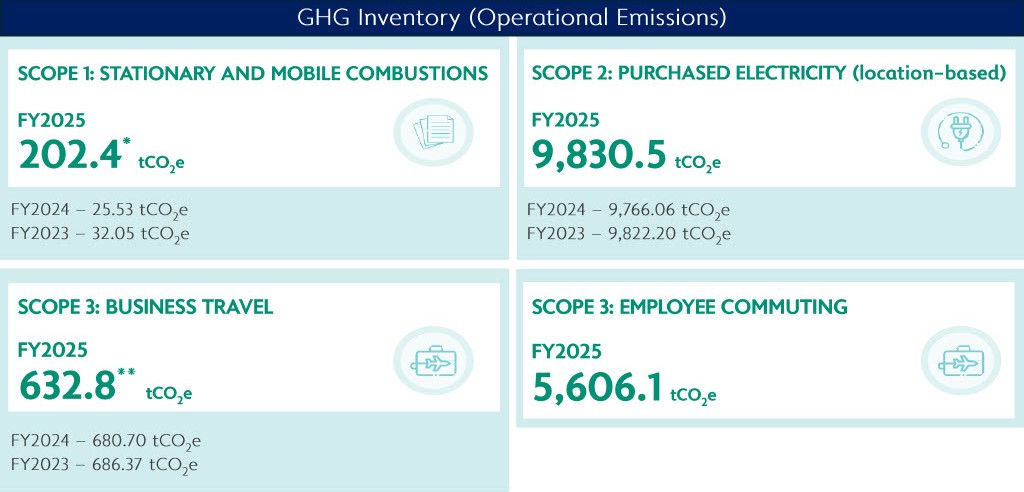 |
| tCO2e = tonnes of carbon dioxide equivalent * For FY2025, fugitive emissions were included in the Scope 1 emissions calculations. Fugitive emissions were not part of previous years’ Scope 1 emissions. ** For FY2025, an additional parameter has been included in the tracking of business travel emissions which is emissions from business travel by air. |
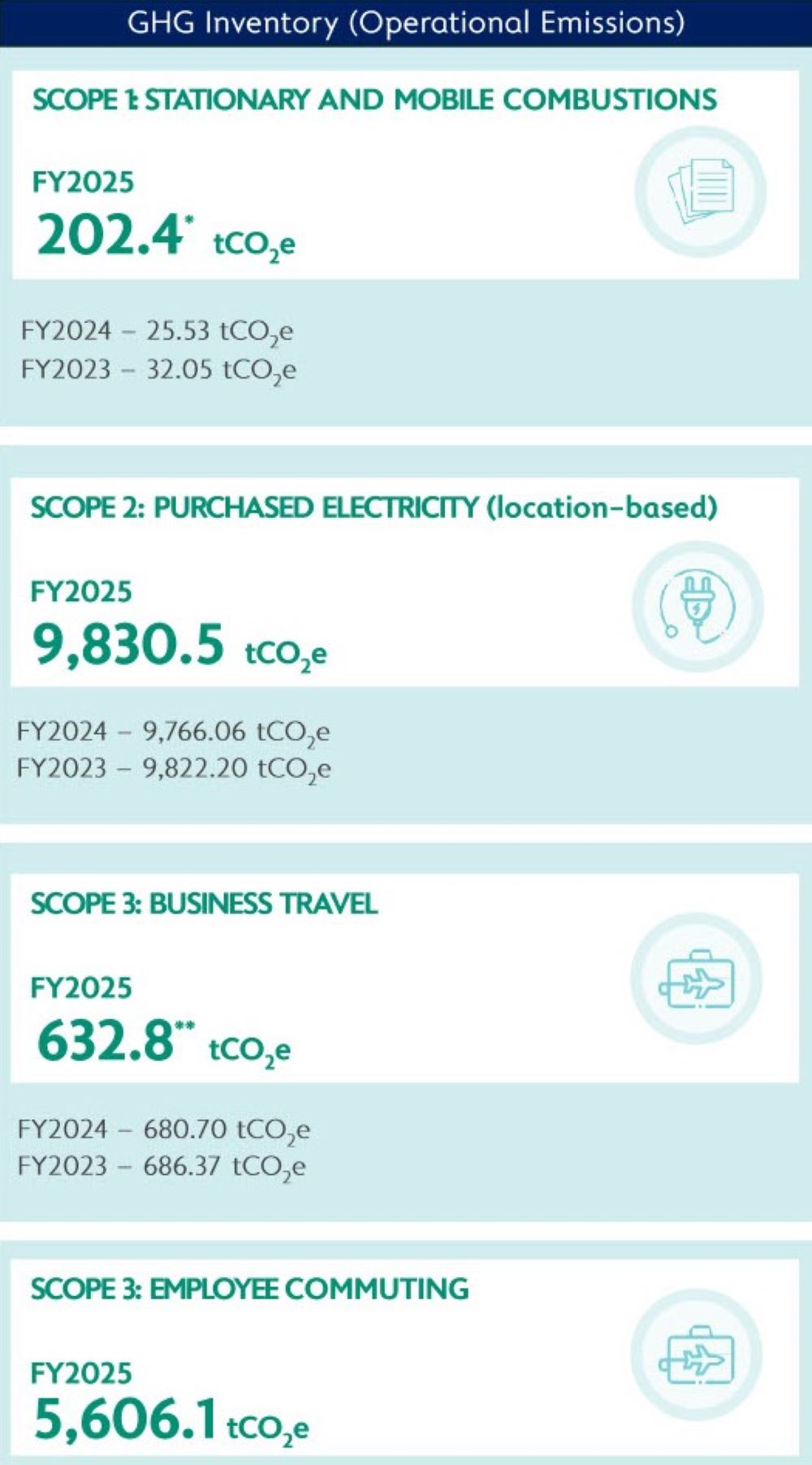 |
|
Scope 3 Category 15: Financed Emissions
To calculate our financed emissions, we have adopted the Partnership for Carbon Accounting Financials (“PCAF”) Standard, which build upon the GHG Protocol Corporate Value Chain (Scope 3) Accounting and Reporting Standard.
Our Financed Emissions are based on our lending and investment portfolios across five PCAF asset classes, with a focus on eight high-emitting sectors, which are construction, real estate, iron and steel, forestry and logging, palm oil, oil and gas, power generation and coal.
The table below shows the bank’s financed emissions as of 31 March 2024. Due to the reporting timing of emissions and financial disclosures by our customers and investees, our financed emissions inventory reflects data that is 12 months behind the current reporting period.
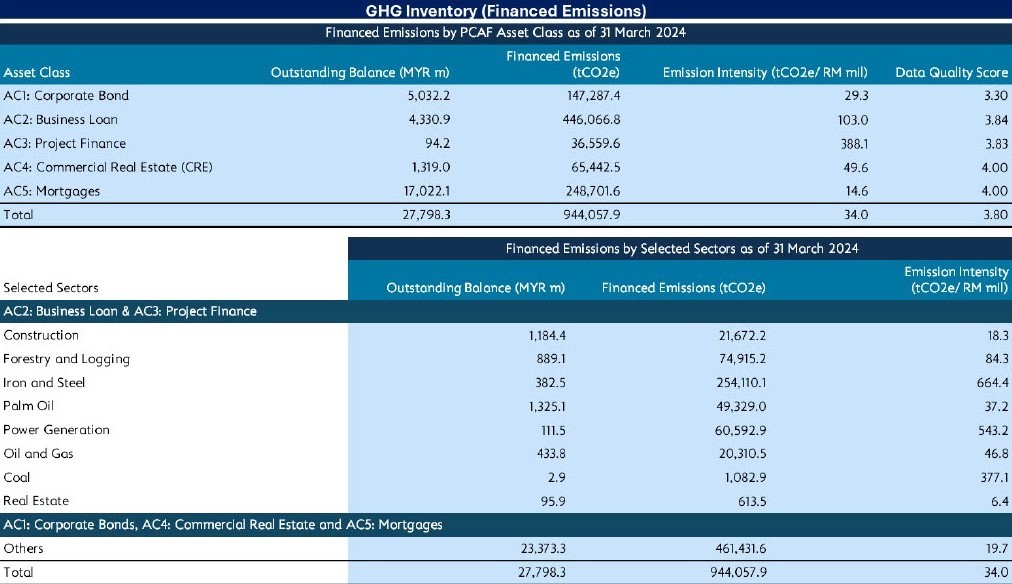 |
|
*Note:
|
As part of our commitment to transparent and responsible climate-related disclosures, we acknowledge the following limitations and considerations in the calculation of our financed emissions, in line with the GHG Accounting and Reporting Standard for the Financial Industry developed by the Partnership for Carbon Accounting Financials (PCAF):
-
We have become a signatory to PCAF and have optimised our data collection processes which include updating our emission factors in accordance with the latest data available from the PCAF database to align with global standards and best practices.
-
Our financed emissions are estimated using the best available data, in accordance with PCAF’s data quality hierarchy. In instances where client-specific emissions data is unavailable, we apply regional or sectoral averages as proxies.
-
As we track financed emissions each year, estimates may vary subject to changes to data, movement in our client sector portfolio and financing, changes to valuations and other market factors.
-
Our approach to financed emissions is continuously evolving with advancements in methodologies, data availability and industry practices. We strive to remain aligned with the latest PCAF guidance to ensure our approach remains robust and credible.
-
We are committed to enhancing the accuracy and completeness of our financed emissions estimates. This includes improving internal data collection processes, refining attribution methodologies, increasing the granularity of emissions data, and supporting customers measure and report their emissions data.
Emission Reduction Initiatives and Targets
-
In a step towards reducing the Bank’s greenhouse gas (GHG) emissions footprint, we have established the following short- and long-term climate-related targets which are aligned to our commitments to the ABM:
To reduce our Scope 1 and 2 by 20% by FY2027 against our FY2020 baseline1
Achieve Carbon Net Zero by 20502
Note:- Target covers 91% of FY2020 baseline emissions across Alliance Bank Group’s operations in Malaysia.
- The target of Carbon Net Zero by 2050 is aligned to ABM principles.
-
We currently have a detailed GHG reduction strategy for our Scope 2 emissions, including actions such as reducing our floor space, replacing indoor and outdoor lightings, upgrading air conditioning units, and investing in carbon offsets where necessary.
-
To accelerate our Net Zero 2050 goal, we are in the first phase of our Net Zero journey that focuses on customer engagement and data collection for strengthening of our Scope 3 Financed Emissions. In the next phase, we will refine our financed emissions calculations and perform target setting.
-
As part of our efforts to comply with Bank Negara Malaysia’s (BNM) Policy Document Climate Risk Management and Scenario Analysis (CRMSA), we are working to enhance our methodology in setting metrics and targets, to better assess and manage climate-related risks and opportunities.
-
The full details regarding our emissions profile are detailed in our Annual Report.
Practices at the Workplace
Driven by our commitment to improving the Bank’s ESG practices, we are dedicated to fostering a sustainable work environment that not only aligns with our ethical values, but also actively focuses on reducing our carbon footprint. This includes various initiatives to optimise our resource consumption practices.
Energy Management
In demonstrating our commitment to environmental responsibility, we are proactively minimising energy consumption across our business through our GHG Emissions Reduction Strategy. Currently, we have completed the replacement of all old air conditioners with energy-efficient units and introducing more efficient LED lights within our buildings across phases. In addition, the Bank plans to complete the planned installation of solar panels at 3 Alliance in FY2026.
At Alliance Bank, energy consumption within the organisation is tracked using the emissions factors published by Suruhanjaya Tenaga and our reduction in energy consumption is measured using the International System of Unit (SI Units).
These collective efforts have yielded impressive results, with the Bank achieving a significant 12.9% reduction in overall energy consumption compared to our FY2020 baseline.
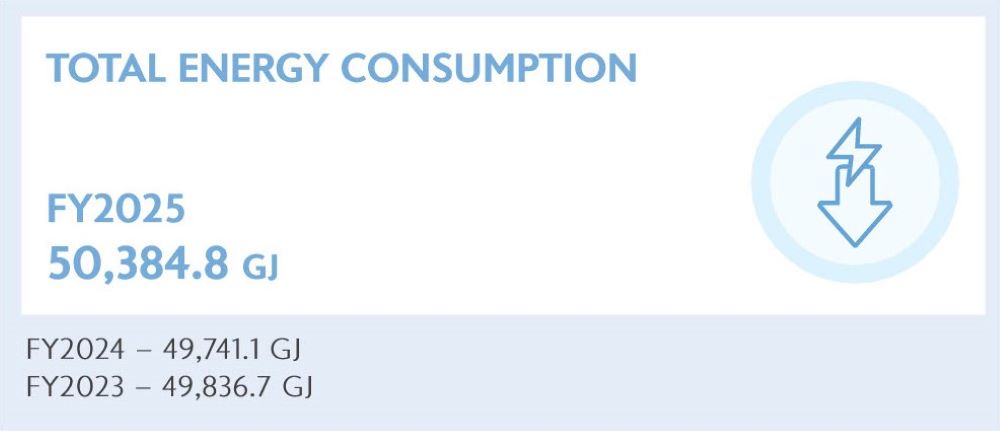 |
|
*Note:
|
The full details of our energy management practices and environmental stewardship initiatives are detailed in our Annual Report.

